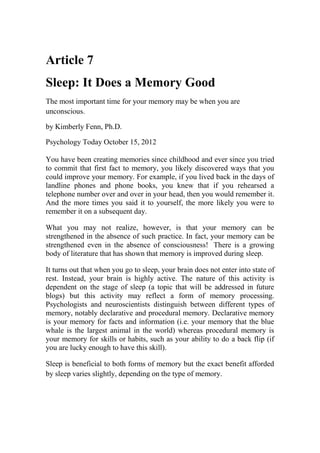
Article 7
- 1. Article 7 Sleep: It Does a Memory Good The most important time for your memory may be when you are unconscious. by Kimberly Fenn, Ph.D. Psychology Today October 15, 2012 You have been creating memories since childhood and ever since you tried to commit that first fact to memory, you likely discovered ways that you could improve your memory. For example, if you lived back in the days of landline phones and phone books, you knew that if you rehearsed a telephone number over and over in your head, then you would remember it. And the more times you said it to yourself, the more likely you were to remember it on a subsequent day. What you may not realize, however, is that your memory can be strengthened in the absence of such practice. In fact, your memory can be strengthened even in the absence of consciousness! There is a growing body of literature that has shown that memory is improved during sleep. It turns out that when you go to sleep, your brain does not enter into state of rest. Instead, your brain is highly active. The nature of this activity is dependent on the stage of sleep (a topic that will be addressed in future blogs) but this activity may reflect a form of memory processing. Psychologists and neuroscientists distinguish between different types of memory, notably declarative and procedural memory. Declarative memory is your memory for facts and information (i.e. your memory that the blue whale is the largest animal in the world) whereas procedural memory is your memory for skills or habits, such as your ability to do a back flip (if you are lucky enough to have this skill). Sleep is beneficial to both forms of memory but the exact benefit afforded by sleep varies slightly, depending on the type of memory.
- 2. In our work in procedural memory, we found that sleep has two separate effects on memory. First, waking activity impairs performance but sleep stabilizes performance. Merely being awake can negatively impact your ability to perform a new skill. Therefore, if you learn a skill in the morning, then you may lose about half of what you learned by the evening. In contrast, sleep stabilizes performance. If you learn the exact same skill in the evening, then your performance is nearly identical the following morning. This means that although a long interval has elapsed, you do not lose any of your learning. Even more exciting, sleep can reverse the damage caused by waking activity. After a night of sleep, skill memory that appeared to have been lost is restored. Sleep therefore confers a distinct advantage to procedural memory; the time at which you learn makes no difference, as long as you sleep afterward. You can learn a skill in the morning, or in the evening, and your performance will be roughly the same the next day. Sleep also strengthens memory for declarative information but the benefits are limited. We, along with several other researchers, have shown that memory for pairs of words (i.e. Cobra-Legs) is better after sleep than after an equal waking interval. This is similar to the findings in procedural memory; however, there is one very clear difference in how sleep affects declarative memory. In declarative memory, waking activity can permanently impair memory. Memory for information that is acquired in the morning is significantly worse after 24-hours than information that is acquired in the evening. To sum it up, if you are trying to learn to surf or to learn a new piano piece, don’t worry if you seem to be getting worse with time – just sleep and performance will be restored! But, if you’re trying to memorize the periodic table, then you might want to study at night to optimize the benefit you receive from sleep.
